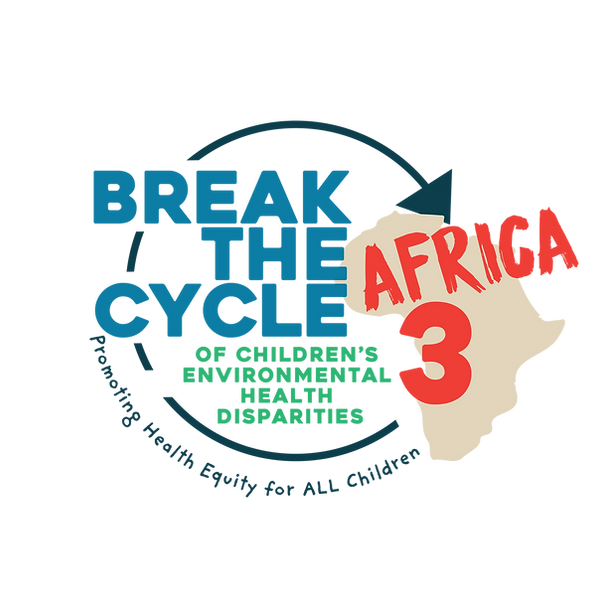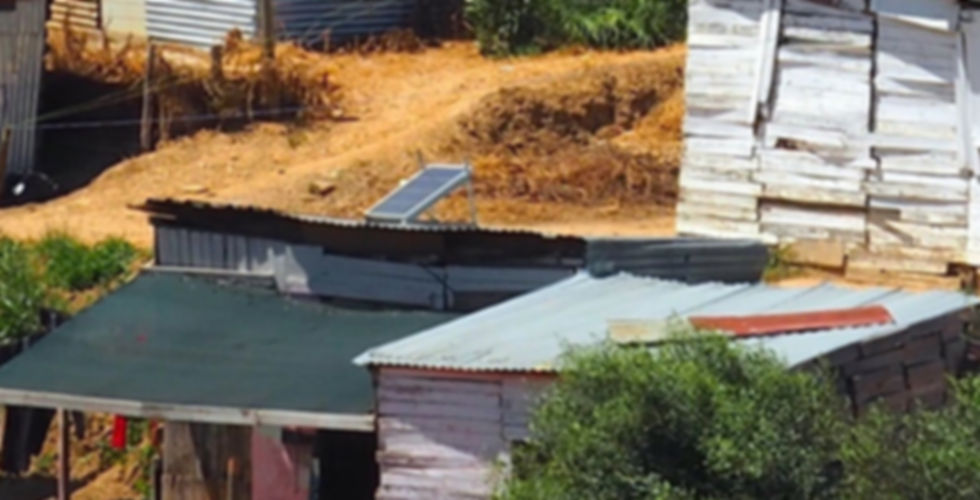
Exploring Social, Economic and Environmental Determinants of Health
Break the Cycle Africa 3
We announce our 3rd Annual Break the Cycle Africa program to provide a platform for students from universities in Africa to showcase research they have done that will Break the Cycle of Children’s Environmental Health Disparities.
Projects that are accepted will be presented at our 3rd International conference on July 15-16, 2026.
We invite interested students (including those who have recently graduated) to submit an abstract of their projects for consideration by March 1, 2026. Abstracts should be submitted online
Abstracts will be reviewed by the Break the Cycle faculty and decisions on selection for participation will be communicated by April 1, 2026.
Questions on project ideas or program details can be directed to our Break the Cycle Coordinator, Ximena Guillen at contact@breakthecycleprogram.org.

Abstracts should be submitted online

THANK YOU
ALL OF THE BTC AFRICA 2
PARTICIPANTS AND CONFERENCE ATTENDEES!!
SEND US YOUR
COMMENTS , IDEAS, QUESTIONS
2nd Annual Virtual Conference:
Break the Cycle of Children’s Environmental Health Disparities in Africa
Services

BREAK THE CYCLE: AFRICA 2
JULY 16+17 2025
VIRTUAL CONFERENCE
Hosted by:
Centre for Children’s Environmental Health of South Africa
School of Public Health, University of Zambia
Break the Cycle of Health Disparities Inc.
PROGRAM for DAY 1
Session 1: Break the Cycle of Toxic Exposures
Leslie Rubin
10:00-10:15
Opening & Welcome
Leslie Rubin
10:15-10:30
Introduction to BTC Africa Programme
Leslie Rubin
10:30-10:55
Cookstove technologies and child safety; a case of indoor air pollution and burns in selected townships of Lusaka
Goodson Shalubala
10:55-11:20
Environmental Shock and Child Health: Evidence from Toxic Waste Dumping in Ivory Coast (Work in Progress)
Epio Odette Bayala
11:20-11:45
Children’s Environmental Health Disparities in Africa
Gandonu Yewhenu
- - - - 11:45-12:00 BODY BREAK - - - -
12:00-12:30
Catalyzing Sustainable Development with Family Empowerment
Keynote Speaker: Yossef Ben-Meir
- - - - 12:30-12:55 lunch BREAK - - - -
Session 1: Break the Cycle for the Youth
Amanda Mbikwana
13:00-13:25
Sanitation Practices and their Determinants Among In-school and Out-of-school Adolescents in Rural and Urban Malawi
Monica Nzanga
13:25-13:50
The Impact of Water, Sanitation, and Hygiene (WASH) Practices on the Dignity of Adolescent Girls in Secondary School in Windhoek, Namibia
Hertha Karin Kadhikwa
13:50-14:15
Emerging substances of abuse and “cheap highs” among Nigerian youths
Nenubari Naabiae
- - - - - - 14:15-14:30 BODY BREAK - - - - -
14:30-14:55
Fit for Life: Enhancing Health Equity through Sports in Mathare Slums, Nairobi County, Kenya (Research Proposal)
Kenfrey Mutugi Kimathi
14:55-15:25
Environmental Chemicals and Children’s Health in Africa
Keynote Speaker: Ramsook Loykisoonlal
15:25-15:30
Summary of the day & Closure
Leslie Rubin
PROGRAM for DAY 2
Session 1: Break the Cycle of Environmental Pollution
Orish Ebere Orisakwe
10:15-10:40
Respiratory conditions and health symptoms associated with air pollution amongst children aged six years and below in Melusi Informal Settlement, Tshwane Metropolitan Municipality, South Africa: a cross-sectional study
Makgalemane Moipoti Ruth
10:40-11:05
A social approach to air pollution: knowledge, attitudes, and practices of early childhood development centres teachers in Khayelitsha Township, South Africa; A cross-sectional study
Lusani Mbadaliga
11:05-11:30
Body burden of heavy metals and drug failures: Any link?
James Ibibama
- - - - 11:30-11:45 BODY BREAK - - - -
11:45-12:10
Bridging schools and families through fitness as a holistic approach to children’s health equity
Jane Gatheru
12:10-12:40
Multi-sectoral action to control infectious diseases – experiences from Africa and the Pacific Islands
Keynote Speaker: Joel Negin
- - - - 12:40-13:05 LUNCH BREAK - - - -
Session 2: Break the Cycle of Poor Nutrition
Nosiku Munyinda
13:10-13:35
Prevalence and Trends of Diarrhoea in Children Under Five at Masiphumelele, Cape Town, South Africa (2019-2023)
Prince Mokoena
13:35-14:00
Compliance of food preparation areas at day care centres in Mbombela, Mpumalanga, South Africa
Mosima Dikeledi Lawrencia Seabela
14:00-14:25
Climate Change as a Predictor of Malnutrition in eSwatini: Evaluating the Pediatric Health Disparities
Nokwanda Kota
- - - - 14:25-14:40 BODY BREAK - - - -
14:40-15:10
Evidence Is Not Enough: Mobilizing Power to End Children’s Health Disparities
Keynote speaker: Yomi Noibi
15:10-15:20
Conference Summary
Samantha Lange
15:20-15:30
Way forward, Group photo & Closure
Leslie Rubin

Meet the BTC Africa 2 Trainees

James Ibibama
Body Burden of Heavy Metals and Drug Failures
University of Port Harcourt
Prof Orish Ebere Orisakwe
Ibibama James Owupele is a dedicated community pharmacist and a postgraduate student pursuing a Master of Science degree in Experimental Pharmacology and Toxicology at the University of Port Harcourt, Rivers State, Nigeria. He obtained his Bachelor of Pharmacy (B.Pharm) degree from Nnamdi Azikiwe University, Awka, Nigeria.
With a strong foundation in pharmaceutical sciences, Mr. Ibibama is passionate about advancing research at the intersection of toxicology and pharmacology. His academic and research interests centre on oxidative stress, environmental toxicants, and the therapeutic potential of natural antioxidants. He is particularly driven to explore how environmental exposures influence human health and how plant-based interventions can mitigate toxicological damage.
Combining practical experience as a community pharmacist with his academic pursuits, Mr. Ibibama aspires to contribute meaningfully to public health and scientific knowledge, especially in areas that address the growing burden of environmental toxicity in sub-Saharan Africa.

Monica Nzanga
Sanitation Practices and their Determinants Among In-school and Out-of-school Adolescents in Rural and Urban Malawi
Malawi University of Business and Applied Sciences
Dr. Kondwani Chidziwisano
Monica Nzanga is an early career researcher with extensive experience in the fields of Environmental Health, specializing in Water, Sanitation, and Hygiene (WASH) and injury prevention research. Monica holds a Bachelor’s and Masters of Science in Environmental Health from the Malawi University of Business and Applied Sciences (MUBAS). Monica’s unwavering dedication to improving the health and well-being of people is the driving force behind her commitment to understanding and addressing the intricate factors that shape their lives. Her work continuously seeks to empower and uplift communities, with a particular focus on promoting evidence-based interventions that enhance the overall health and well-being of vulnerable populations. Monica has authored and co-authored several publications in the field of environmental health and injury prevention.

Epio Odette Bayala
Environmental Shock and Child Health: Evidence from Toxic Waste Dumping in Ivory Coast
Université de Sherbrooke
Amanda Guimbeau, Assistant Professor of Economics at Université de Sherbrooke
Epio Odette Bayala holds a master’s degree in development economics from the Catholic University of West Africa (Abidjan, Côte d’Ivoire). Driven by a strong commitment to devising practical solutions that enhance the well-being of vulnerable populations in developing countries, she has chosen to specialize in Development Economics. Currently, she is pursuing a Ph.D. in Development Economics at the Université de Sherbrooke (Québec, Canada). Her research focuses on the impacts of environmental shocks, including toxic waste dumping, coastal erosion, and mining activities, as well as agricultural policies within the context of climate change. Her participation in Break the Cycle Africa 2 marks the presentation of the first chapter of her dissertation, which investigates how the transfer of hazardous waste from the Global North to the Global South can exert long-lasting effects on child health, extending beyond the generation directly exposed at the time of the shock.

Mosima Dikeledi Lawrencia Seabela
Compliance of Food Preparation Areas at Day Care Centres in Mbombela, Mpumalanga, South Africa
University of Johannesburg
Dr. Charlotte Mokoatle
Mosima Dikeledi Lawrencia Seabela is an Environmental Health Practitioner serving in the Military Health Services. She is currently pursuing her PhD at the University Of Johannesburg, South Africa. Born in Limpopo, Dikeledi grew up in the dusty roads of Danhouse, Hammanskraal, where her journey began. With a strong passion for Environmental Health and a commitment to serving her community, Dikeledi continues to make a positive impact in her field. Her research interests are particularly focused on protecting vulnerable populations, as evident in her Masters project, which evaluated food safety compliance in Day care centers of Mbombela, South Africa- a testament to her dedication to children’s health and well-being. Outside of her professional pursuits, Dikeledi is blessed with a loving family; she is happily married and mother of two beautiful boys, Lethabo and Rethabile, who bring joy and fulfillment to her life. Her academic pursuits and professional endeavors reflect her commitment to advancing knowledge and improving public health.

Nokwanda Kota
Climate Change as a Predictor of Malnutrition in Eswatini:
Evaluating the Pediatric Health Disparities
University of eSwatini (UNESWA)/University of Texas Houston(UTHouston)
Dr. Mduduzi Shongwe (UNESWA) /Dr. Kevin Lanza (UTHouston)
Nokwanda Kota is a doctoral student in Health Policy and Healthcare Management at the University of Texas, Houston. She is a medical doctor and researcher with the Global TB Program at the Baylor Children’s Foundation in eSwatini. Her research interests lie at the intersection of environmental and socio-economic determinants of health and pediatric TB and HIV in eSwatini. Her current research proposal seeks to evaluate the impact of climate change in eSwatini as a driver of pediatric health disparities as it relates to malnutrition.

Hertha Karin Kadhikwa
The Impact of WASH and Menstrual Hygiene Facilities on the Dignity of Adolescent Girls in School Settings.
University of Johannesburg
Dr. Samantha Lange and Co-Supervisor, Ms. Renay Van Wyk
I am a registered nurse who began my professional journey in paediatric nursing, later transitioning into HIV prevention and biomedical interventions within the private sector. With over 20 years of experience in HIV case management, I have developed a strong foundation in community-focused healthcare. I hold a post-diploma in HIV Management from Stellenbosch University and a BA in Human and Social Sciences, specializing in Community Development. I am currently pursuing a Master’s in Public Health at the University of Johannesburg. My work is grounded in public health, driven by a passion for breaking cycles of inequality and challenging harmful cultural norms. My vision is to advocate for health equity and contribute to a sustainable, inclusive healthcare system that reaches all individuals, regardless of gender, age, or background, through community-driven and equitable care.

Prince Mokoena
Prevalence and Trends of Diarrhoea in Children Under Five at Masiphumelele, Cape Town, South Africa (2019-2023)
University of Cape Town
Dr Meryl Jagarnath
Prince Mokoena is an Environmental Health Practitioner at the City of Cape Town. He holds a BTech degree in Environmental Health and is currently pursuing a Master of Public Health with a focus on Environmental Health. He has already submitted his thesis for examination.
Originally from Cunningmore B village in Bushbuckridge, Mpumalanga, Prince is deeply passionate about research, particularly in the areas of child health and children’s rights. His interest in these fields was sparked through his work inspecting Early Childhood Development (ECD) centres and investigating infectious diseases. This experience led him to conduct research on the trends and prevalence of diarrhoea among children under the age of five, further fuelling his commitment to public health research.

Naabiae Nenubari
Emerging substances of abuse and “cheap” highs among Nigerian youths
University of Port Harcourt
Prof Orish Ebere Orisakwe
Naabiae Nenubari is a graduate in Physiology from the University of Port Harcourt. He currently works as a researcher at the Provictoire Research Organization, where he contributes to advancing scientific inquiry and innovation. He is passionate about brain science and studies related to mental and environmental health.

Lusani Mbadaliga
A social approach to air pollution: knowledge, attitudes, and practices of early childhood development centres teachers in Khayelitsha Township, South Africa; a cross-sectional study
University of Pretoria
Prof Joyce Shirinde
Lusani Odelia Mbadaliga is an Environmental Health Practitioner from Manyii Village, Limpopo Province, South Africa, currently based in the Western Cape Province. She recently completed her Master of Public Health at the University of Pretoria. She has been an independent Environmental Health Practitioner for 10 years and currently practices in one of the big townships in the Western Cape province. Her work inspired her to conduct a research project within the Early Childhood Development (ECD) sphere to strengthen advocacy for children’s health from different backgrounds. The research interests were ECD teachers and air pollution knowledge, attitudes, and practices. She is preparing her proposal for her PhD studies, focusing on children's exposure to environmental air pollution and becoming an expert in the field.

Goodson Shalubala
Cookstove Technologies and Children Safety; A Case of Indoor Air Pollution and Burns in Selected Townships of Lusaka, Zambia
University of Zambia
Dr. Nosiku Sipilanyambe Munyinda
I am currently studying for a Masters of Public Health in Environmental Health at The University of Zambia in the School of Public Health under the Department of Environmental Health, where I am doing my postgraduate research – “An Evaluation of clean cookstove technologies adoption in the selected townships of Lusaka District of Zambia”.
I hold a Bachelor’s of Science degree in Environmental Health from the University of Zambia, School of Public Health and currently working as a tutor at the same institution in the department of Environmental Health for undergraduate studies. I also work as a Lecturer at Harvest University under the department of Environmental Health with focus in Chemical Safety and Management, and Building Science (Principles and Design).
In the field of research, I have worked as a research assistant on the Kabwe Mine Pollution Amelioration Initiative (KAMPAI) with focus on mother and children and the responsibilities that ranged from administering the Quality-of-Life Questionnaire and collection of samples for both the mothers and their children.

Moipoti Ruth Makgalemane
Respiratory conditions and health symptoms associated with air pollution amongst children aged six years and below in Melusi Informal Settlement, Tshwane Metropolitan Municipality, South Africa: a cross-sectional study
School of Health Systems and Public Health, Faculty of Health Sciences, University of Pretoria
Prof Joyce Shirinde
I am a public health researcher at the Human Sciences Research Council (HSRC), working within the Public Health, Societies and Belonging (PHSB) research division. I hold a Master of Public Health degree from the University of Pretoria, where I developed a strong foundation in health systems research, social determinants of health, and community-based approaches to improving well-being. At the HSRC, my work is grounded in multidisciplinary research that explores how health is shaped by broader social, cultural, and environmental contexts, especially among vulnerable and marginalized groups. I am passionate about using research and health promotion to tell meaningful stories, drive policy change, and support healthier communities. My interests lie in environmental health, mental health, health equity, and understanding how people experience and navigate health and care in everyday life.

Kenfrey Mutugi Kimathi
Fit for Life :Enhancing Health Equity through Sports in Mathare Slums, Nairobi County, Kenya
Kenyatta University
Dr Stanley Kagunda (mentor) , Prof. Lanza Kevin L (co-mentor)
Kenfrey Mutugi Kimathi is a dedicated educator and fitness advocate with a strong passion for promoting healthy living and active lifestyles. A graduate of Kenyatta University, he holds a degree in Physical Education and Library Science, equipping him with a unique blend of knowledge to develop innovative fitness based programs. Currently serving as a teacher in the Sports Department at St. Christopher’s International School, Kenfrey is committed to nurturing physical well being among students. Beyond the classroom, he actively engages in grassroots initiatives, collaborating with Kenyan academies and KCA University to coordinate holiday programs for children from Mathare Slum, fostering talent and encouraging healthy habits from a young age.
A firm believer in the power of fitness to transform lives, Kenfrey champions healthy living through advocacy, community engagement, and practical training programs. His mission is to inspire individuals of all ages to embrace an active, balanced lifestyle for long-term well-being.

Jane Gatheru
Bridging Schools and Families through Fitness as a Holistic Approach to Children’s Health Equity
Kenyatta University
Dr Stanley Kagunda
Jane Gatheru is a wellness and fitness education professional with a background in Exercise and Sports Science. She is passionate about promoting health and well-being among children ,youth and the community in general through movement, outdoor engagement, and lifestyle awareness.
She brings a practical and inclusive approach to child-centered fitness, drawing on her expertise in therapeutic exercise, injury prevention, and youth-friendly wellness coaching. She supports the design and facilitation of nature-based physical activities that build self-confidence, teamwork, and environmental stewardship among children.
As part of her role, Jane helps coordinate outdoor sessions that combine physical movement with lessons on sustainability, clean living, and personal health responsibility. She also contributes to behavior change communication efforts, encouraging active living as a foundation for lifelong wellness and environmental responsibility.Jane is known for her energy, empathy, and ability to connect with people across different backgrounds.

Stephen Yewhenu Gandonu
Clean Environment: Children’s Health
Wesley University Ondo
Reverend Dr Joseph Alagi
Stephen Yewhenu is a dedicated student at Wesley University. Passionate about social impact, he actively advocates for cleaner, safer environments and decent living conditions in the Makoko and Oko-Agbon slum communities. Stephen holds a Diploma in Business Development and Strategy from the DRN School of Entrepreneurship, UK, equipping him with skills to drive sustainable change. Committed to serving others, he engages in missionary work, reaching out to remote communities with compassion and purpose.

Keynote Speakers

Yossef Ben-Meir
Catalyzing Sustainable Development with Family Empowerment
Dr. Yossef Ben-Meir is founder and president of the High Atlas Foundation, a Moroccan-U.S. not-for-profit organization dedicated to sustainable development. He is also currently a Visiting Professor of International Studies at the University of Virginia. In Morocco, he was a Peace Corps Volunteer (1993-95), Associate Peace Corps Director (1998-99), a researcher at the American Institute of Maghrib Studies (2003), and a Professor at Al Akhawayn University at the School of Social Sciences and Humanities (2009-10). Dr. Ben-Meir holds a PhD in sociology from the University of New Mexico (2009), an MA in international development from Clark University (1997), and a BA in economics from New York University (1991). He is the author of 160
articles on sustainable development in Morocco, the Middle East, and the United States.

Joel Negin
Multi-sectoral action to control infectious diseases – experiences from Africa and the Pacific Islands
Joel Negin is Professor of Global Health in the Faculty of Medicine and Health at the University of Sydney. Prior to this, he served for eight years as the Head of the School of Public Health including through the COVID-19 pandemic. Joel’s research focuses on the social determinants of health with a focus on improving the health status of those with greatest need. He maintains projects in Australia, Indonesia, Vietnam and Fiji. Before moving to Australia, he was awarded degrees from Harvard and Columbia Universities and then worked for six years in sub-Saharan Africa on various health and development programs.

Ramsook Loykisoonlal
Environmental Chemicals and Children’s Health in Africa
Ramsook Loykisoonlal is the Deputy Director for Environmental Health (Chemicals and Waste Management) at the National Department of Health, South Africa. In this role, he develops, coordinates, monitors, and promotes health services through legislation, and leads the development of policies, regulations, and guidelines for the control of hazardous substances, healthcare waste management, and chemical safety — all aimed at improving public health across the country.
He holds a Master’s Degree in Environmental Health, a Postgraduate Diploma in Health Management, and a Postgraduate Diploma in Pesticide Risk Management, along with a Baccalaureus Technologiae and National Diploma in Public Health.
Mr. Loykisoonlal has more than 19 years of experience in middle management at the national level and over seven years of progressive experience at various levels — from junior to assistant director — in environmental health at the Gauteng Department of Health. Earlier in his career, he also served as a Community Liaison Officer in health promotion.

Yomi Noibi
Evidence Is Not Enough: Mobilizing Power to End Children’s Health Disparities
Dr. Yomi Noibi has held a diversity of positions in the fields of environmental health and justice; he held teaching positions at the University of Wisconsin, Green-Bay and the University of Lagos before moving on to lead the Education Department and served as Project Director for the Nigerian Conservation Foundation. After leaving the Foundation, he became engaged with Environmental Community Action Inc. (ECO-Action)--beginning as a community organizer and eventually serving as ECO-Action’s Executive Director from 2005 to 2022. He worked in both academia and industry before the need and challenge of transferring environmental health knowledge and research findings into intervention strategies that prevent and reduce exposure to environmental hazards changed his perspective on his academic and professional aspirations. Association for many years and has taught - informally and formally - and ever increasing number of
people about the Precautionary Principle ("Better Safe than Sorry") while helping to grow the Proctor Creek Stewardship Council. Dr. Yomi earned MSc. and Ph.D. from the University of Iowa in Science Education with a focus on Environmental Science and Industrial Hygiene and Safety.
DOWNLOAD
THE BREAK THE CYCLE AFRICA 2
BROCHURE


The 1st BTC AFRICA CONFERENCE
The 1st Annual
BTC Africa (Virtual) Conference took place July 17-18, 2024
Scroll down for the Conference Archive
BREAK THE CYCLE: AFRICA

1st Annual Virtual Conference:
Break the Cycle of Children’s Environmental Health Disparities in Africa
JULY 17+18 2024
Amanda Mbikwana
Director,
Centre for Children’s Environmental Health of South Africa
We are proud to launch the Break the Cycle Africa project to provide a platform for students from universities in Africa to showcase their research that breaks the cycle of children’s environmental health disparities at one or more points in the cycle.
We invited interested students (including those who have recently graduated) to submit research proposal for the Break the Cycle of Children’s Health Disparities Africa by for consideration.
Students at universities in all countries in Africa who have done research projects involving children’s health and the environment were invited.


Trainee Projects
Mwitwa Mugode
The University of Zambia, School of Public Health
Lead Pollution Exposure and Impact on Environmental Health
Napo Julius Molahlehi
University of Johannesburg
Assessment of blood lead levels and it's risk factors amongst primary school children in Maseru District, Lesotho
Charlotte Mokoatle
University of Johannesburg
Lead Contaminated Soil Exposure in Communities Nearby Mine Dumps Remain Harmful to Children’s Environmental Health
Sunnieboy Njikho
University of Johannesburg
Evaluation of the Prevalence of Schistosomiasis Amongst School-Aged Children in Low- and Middle-Income Communities: Ehlanzeni District Municipality, South Africa, 2015-2021
Hayley Kimberlynn Langley
Cape Peninsula University of Technology
The Influence of Training on Food Handlers’ Hygiene Knowledge and Practices in the National School Nutrition Programme of a Cape Winelands Sub-district Municipality, Western Cape, South Africa
Ammira Nyiko Mlangeni
University of Johannesburg
Knowledge, Attitudes, and Practice of Food Safety and Hygiene among Food Handlers in Primary and Secondary Schools: Nkowankowa Circuit, Limpopo
Francesca Raoelison
Brown University
Breaking the Cycle of Emotional Abuse for Youth and Children in Madagascar
Merisha Babulall
University of Johannesburg
Determining the Level of Food Safety Practices at Registered Early Childhood Development Centres within the Ethekwini Communities
Shalubala Goodson
The University of Zambia, School of Public Health
Cookstove Technologies and Children Safety; a Case of Indoor Air Pollution and Burns in Selected Townships of Lusaka
Beatrice C Mutai
University of Nairobi
Prevalence and Cofactors for Cognitive Stimulation Among Mothers of Infants Living in Nairobi, Kenya.
Angelina Uzor
East Tennessee State University
Climate Literacy and Children’s Health in Nigeria: Integrating Climate Literacy to Address Children’s Environmental Health Disparities
Onyinyechi Bede-Ojimadu
Kampala International University, Uganda
Exposure to Environmental (Chemical and Biological) Hazards and Children Undernutrition: A Scoping Review
Amarachi Paschaline Onyena
Nigeria Maritime University, Okerenkoko, Delta State, Nigeria
Lactational Exposure of Human Infants to Metal(loid)s: a Comparison Between Sub-Saharan Africa and Mediterranean Europe.
Keynote Speakers
The Impact of Rising Ambient Temperatures on the Physical and Mental Health of Children in Africa – Actions to Eliminate Threats and Improve Health
-
PhD (Preventive and Social Medicine)
-
Chief Specialist Scientist: Environment and Health Research Unit
-
Lead: Climate Change and Human Health Research Programme
-
South African Medical Research Council
-
Extraordinary Professor: Department of Geography, Geoinformatics and Meteorology, University of Pretoria
-
Visiting Professor: Department of Environmental Health, University of Johannesburg
CARADEE WRIGHT

The Equity Lens: Implications for Environmental Health Research and Practice
ONYEMAECHI NWEKE , DrPH, MPH
-
Snr. Science Advisor
-
Policy and Analysis Division | Office of Environmental Justice and External Civil Rights
-
US Environmental Protection Agency

Food and Nutrition Insecurity Amongst Children Across Africa
PROF MICHAEL RUDOLPH
Director, Centre for Ecological Intelligence,
Faculty of Engineering
University of Johannesburg, South Africa

How is Climate Change a Threat Multiplier in Africa
DR. MARGOT BROWN

Senior Vice President of Justice and Equity
Environmental Defense Fund.
Currently, she is implementing a strategy at EDF to integrate environmental justice into organizational processes, policies, and work around the globe.
Questions on project ideas or program details can be directed to our Break the Cycle Coordinator, Ximena Guillen at contact@breakthecycleprogram.org
or to Break the Cycle Director, Leslie Rubin MD at lrubi01@emory.edu.

Please register to attend the conference.
You will receive a zoom link a few days before the conference.
Programme:
Programme Day 1
Programme Day 2
Program times are in GMT +2
DAY 1 – July 17:
Session 1:
ENVIRONMENTAL IMPACT ON CHILDREN’S HEALTH DISPARITIES
Moderator: Leslie Rubin
10:00 am GMT +2 Opening and Welcome:
Amanda Mbikwana, Nosiku Munyinda, Leslie Rubin
10:15 am GMT +2 Break the Cycle of Children’s Environmental Health Disparities:
Leslie Rubin
10:45 am Prevalence and cofactors for cognitive stimulation among mothers of infants living in Nairobi, Kenya
Student: Beatrice Mutai
Mentor: Professor Elizabeth M. Obimbo
University: University of Nairobi
11:05 am Breaking the cycle of emotional abuse for youth and children in Madagascar
Student: Francesca Raoelison
Mentor: William J Allen
University: Brown University
11:05 am Body Break
11:35 am Assessment of blood lead levels and it's risk factors amongst primary school children in Maseru District, Lesotho
Student: Napo Julius Molahlehi
Mentor: Dr. Thokozani Mbonane
University: University of Johannesburg
11:55 am KEYNOTE ADDRESS
The Impact of Rising Ambient Temperatures on the Physical and Mental Health of Children in Africa – Actions to Eliminate Threats and Improve Health
Caradee Yael Wright PhD, Chief Specialist Scientist: Environment and Health Research Unit, Lead: Climate Change and Human Health Research Programme, South African Medical Research Council
12:30pm LUNCH BREAK
Session 2:
ENVIRONMENTAL JUSTICE AND CHILDREN’S HEALTH DISPARITIES Moderator: Nosiku Munyinda
13:00 University of Zambia and Break the Cycle Africa: Nosiku Munyinda
13:30 Evaluation of the Prevalence of Schistosomiasis Amongst School-Aged Children in Low- and Middle-Income Communities: Ehlanzeni District Municipality, South Africa, 2015-2021
Student: Sunnieboy L. Njikho
Mentor: Renay Van Wyk
University: University of Johannesburg
13:50 Cookstove technologies and children safety: a case of indoor air pollution and burns in selected townships of Lusaka
Student: Goodson Shalubala
Mentor: Nosiku Munyinda Sipilanyambe
University: University of Zambia, School of Public Health
14:10 Body Break
14:20 Exposure to chemical and biological environmental hazards and children’s undernutrition: a scoping review
Student: Onyinyechi Bede-Ojimadu,
Mentor: Orish Ebere Orisakwe PhD
Kampala International University, Uganda
14:40 KEYNOTE ADDRESS
The Equity Lens: Implications for Environmental Health Research and Practice
Onyemaechi Nweke DrPH, MPH, Office of Environmental Justice and External Civil Rights, US Environmental Protection Agency
15:20 Summary of the Day: Nosiku Munyinda
15:30 Closure
Program times are in GMT +2
DAY 2 – July 18:
Session 1:
FOOD INSECURITY AND FOOD SAFETY
Moderator: Amanda Mbikwana
10:00 am GMT +2 Opening and Recap:
Samantha Lange
10:15 am Centre For Children’s Environmental Health
Amanda Mbikwana
10:45 Knowledge, Attitudes, and Practice of Food Safety and Hygiene among Food Handlers in Primary and Secondary Schools: Nkowankowa Circuit, Limpopo
Student: Ammira Mlangeni
Mentor: Dr Mpinane Flory Senekane
University: University of Johannesburg
11:05 The influence of training on food handlers’ hygiene knowledge and practices in the National School Nutrition Programme of a Cape Winelands sub-district municipality, Western Cape, South Africa
Student: Hayley Langley
Mentors: Prof. I Human & Prof J. Odendaal
University: Cape Peninsula University of Technology
11.:25 Body Break
11:35 Determining the level of food safety practices at registered early childhood development centres within the Ethekwini communities.
Student: Merisha Babulall
Mentor: Dr Samantha Lange
University: University of Johannesburg
11:55 Lactational exposure of human infants to metal(loid)s: a comparison between sub-Saharan Africa and Mediterranean Europe
Student: Amarachi Paschaline Onyena
Mentor: Orish Ebere Orisakwe PhD
University: Nigeria Maritime University, Okerenkoko, Delta State, Nigeria
12:15 KEYNOTE ADDRESS
Food and nutrition insecurity amongst children across Africa
Prof Michael Rudolph, Director, Centre for Ecological Intelligence, Faculty of Engineering University of Johannesburg, South Africa
12:45 LUNCH BREAK
Session 2:
THREATS OF CLIMATE CHANGE
Moderator: Leslie Rubin
13:15 Lead pollution exposure and impact on environmental health
Student: Mwitwa Mugode
Mentor: Nosiku Munyinda Sipilanyambe.
University: University of Zambia, School of Public Health
13:35 Lead contaminated soil exposure in communities nearby mine dumps remain harmful to children’s environmental health
Student: Charlotte Mokoatle
Mentors: Dr Nkosi, Prof Mathee
University: University of Johannesburg
13:55 Climate Literacy and Children’s Health in Nigeria: Integrating Climate Literacy to Address Children’s Environmental Health Disparities
Student: Angelina Uzor
Mentor: Dr. Mildred Maisonet
University: East Tennessee State University
11.:25 Body Break
14:35 KEYNOTE ADDRESS
How is Climate Change a Threat Multiplier in Africa
Dr. Margot Brown, Senior Vice President of Justice and Equity, Environmental Defense Fund.
15:05 Conference Summary: Samantha Lange
15:15 Wrap Up and Future Plans :
Amanda Mbikwana, Nosiku Munyinda and Leslie Rubin
15:30 Closure
Public Health: International Aspects on Environment and Health
This volume presents the set of Break the Cycle projects that look at the international stage. Environmental conditions and health disparities are universal and represent a challenge for our global village. We hope to see many more students assist with this program in different international settings. The students are, after all, our future; our work is a preparation for them to make the world a better place for generations to come.
Poverty, disadvantage, disease and disability are all global challenges. This global picture has been captured in the Millennium Development Goals 2015, which came out of the Millennium Summit in September 2000, the largest gathering of world leaders in history. We now have the UN Sustainable Development Goals to guide our efforts for the next couple of decades.



